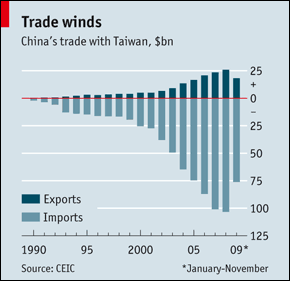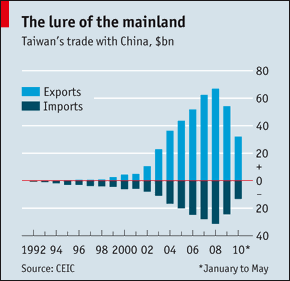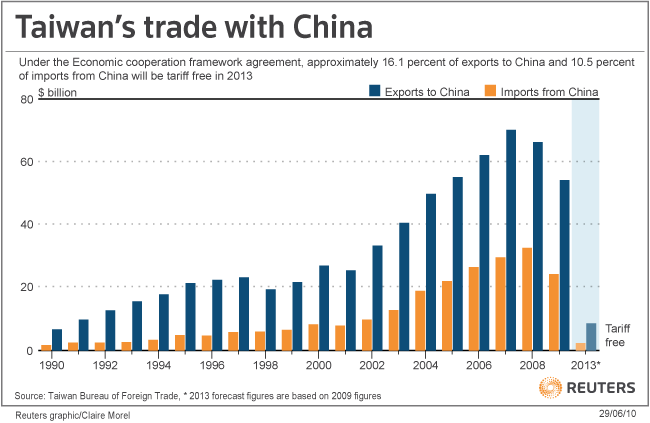Tens of thousands of people protested outside Taiwan’s Presidential Office Building in downtown Taipei last month, stepping up pressure on President Ma Ying-jeou to re-examine a trade deal with Beijing.
At the heart of the protests is the Cross-Strait Service in Trade Agreement signed between Taipei and Beijing last year. The deal, according to the Taiwan government, will help boost the economy by opening service sectors such as banking, health care and food catering to companies across the Taiwan Strait.
So what are the grievances? The most widely held complaint of the protesters is that the agreement passed with little public review. Protesters accused the government of “black box” and have dubbed campaign the Sunflower Movement, meaning sunlight and transparency.
The protesters were also worried China will exert more control over Taiwan’s economy and leave small- to medium-size enterprises in Taiwan struggling to compete. They feared that China’s efforts to absorb the island into its economy are a malicious scheme for ultimately reunifying straits. The main opposition party, the Democratic Progress Party, has been relentlessly against any moves to go closer to its giant neighbor even if on trivial things like allowing more tourists to visit Taiwan.
Resistance to the deal in Taiwan indicated that the Mainland’s strategy of trying to win Taiwan’s heart economically through closer economic ties may not be working.
After the Communist forces led by Mao Zedong won China’s civil war in 1949, Generalissimo Chiang Kai-shek fled to Taiwan with his defeated Kuomintang armies. For decades, hostilities between the Kuomintang government in Taiwan and the Chinese Communist Party led to a policy on the Taiwan side of “no contact, no compromise and no negotiation.”
China has long claimed Taiwan as a part of its territory, It fired missiles over the Taiwan Strait in 1995 and 1996 in response to President Lee Teng-hui’s call for Taiwanese identity. During the 2000-2008 reign of Chen Shui-bian, China frequently condemned him of is his Taiwan independence inclination. In 2005, China passed an anti-secession law that allowed the use of force in the event of a formal declaration of Taiwan’s independence.
After Mr. Ma took presidency in 2008, the two sides began signing a range of economic agreements including the landmark Economic Cooperation Framework Agreement (ECFA) in 2010. ECFA cuts tariffs on 539 Taiwanese exports to China and 267 Chinese products entering Taiwan. Two-way trade doubled since 2008, reaching $197 billion last year.
Beijing tried to use tariff cuts on half as many products from Taiwan to Mainland to appease opponents who warned that Taiwan will be flooded by cheap Chinese products with small businesses squeezed and jobs stolen.
The Taiwanese government has said it believes the ECFA will help create 260,000 jobs and boost economic growth by as much as 1.7%.
Taiwan’s economy depends on trade, and China is its biggest export market and source of a huge trade surplus. China is central to the supply chains of Taiwanese manufacturers, and the destination to 80 percent of Taiwanese foreign direct investment.
Today, 118 airline flights fly back and forth between Taiwan and 54 cities in China per day, mainly packed with Taiwanese businesspeople mainland tourists. Seven years ago, such flights were banned.
There are also over one million Taiwanese working and living in China.
One of the biggest Taiwanese companies, Foxconn Technology, which assembles Apple products, employs hundreds of thousands of workers in Mainland China.
The service agreement centered in this event would open 80 Chinese industries to investment from Taiwan, while Taiwan’s side would open 64. In addition, Taiwan reserves the right to apply many barriers and restrictions. Mr. Ma said that was a sign that China was sacrificing more while Taiwan will be benefitted more in the deal. He argued the deal would create 12,000 jobs and boost service exports by $394 million, nearly a quarter of cross-Strait trade last year.
Ma said, Taiwan, as one member of the “the Four Asian Tigers ”, has already lagged behind regional rivals like South Korea and Singapore and he warned that failing to pass the pack will impede Taiwan to enter other economic agreements, like the American-led Trans-Pacific Partnership.
Chen Deming, China’s chief negotiator in the trade talks with Taiwan, told Xinhua News Agency that he would be “deeply regretful” if the pact isn’t passed in Taiwan. He cited the huge complementarity of the two sides economies as the reason why the deal could be tremendously beneficial to Taiwan’s economy.
Merril Lynch forcasts Taiwan’s economy will grow at 2.9% if the bill passed and 2.55 of it’s delayed into next year.
Many experts argued that with China’s rapid rising in today’s world and Taiwan’s sluggish economy, It is increasingly harder for Taiwan to pay the price of ignoring its giant neighbor.
“The bottom line is that if the same deal was between Taiwan and pretty much any other country in the world it wouldn’t be a problem,” Jonathan Sullivan, an associate professor at the University of Nottingham’s School of Contemporary Chinese Studies told New York Times. “But Taiwan’s relationship with China is unlike any other in the world. And depending on who you talk to, China is Taiwan’s only way to peace and prosperity or an existential threat.”
“Taiwan’s service industry accounts for more than 60 percent of its GDP. However, Taiwan manufacturers got more opportunities in Mainland than service providers. That does not reflect Taiwan economy’s real balance,” said Xianghong Hua, an economic professor at the University of International Business and Economics. “ Then this pact is a perfect opportunity for Taiwan to adjust its investment structure in China, which is definitely mutually beneficial.”
In essence, Beijing, known as a tough negotionator, offered Taiwan a special deal that other countries would kill to get.
Chung-Hua Institution for Economic Research, a government think tank, said the agreement could add 12,000 jobs to Taiwan’s services industry, mainly in retail and storage sectors. It could also add around 0.025-0.034 percentage point to Taiwan’s gross domestic product.
In response to people’s ingrained anxiety about closer economic integration with Beijing, Taiwan’s government said it would earmark nearly US$3 billion to help small and medium enterprises survive or transform themselves against rising competition from across the strait
“Due to globalization and Taiwan’s maturing market, those SMEs are facing a tougher business environment whether there is a services trade pact with China or not. But they just don’t know how they will be assisted, of course they are against the deal,” Mr. Luo, an economist at Fubon Financial Holding told Bloomberg.
Some experts believe The Trade in Services Agreement will not benefit Taiwan’s services exports.
About 2.4 million of its 6 million workers are employed in Taiwan’s 1 million shops and services. Taiwan’s domestic services sector including local retail, printing, e-commerce, logistics, mass transport is in vibrant competition while China’s services sector is far more centralized, and subject to government regulations.
In addition, Taiwanese businesses already have far more access to China’s services sectors than any other foreign investors. However, Taiwanese investors in Mainland do not enjoy the same shields from arbitrary law enforcement, regulations and contract disputes as investors from other countries, which have embassies. Chinese investors, however, in Taiwan’s services industry can be operated in a modern democracy with a rule of law.
Taiwan’s banking institutions are too small and too competitive among themselves to have any structural impact in China’s financial services market. On the other hand, China’s financial institutions are all centrally controlled and have much more capital. The agreement gives Chinese banks and institutions up to 20 percent ownership in Taiwan counterparts, which will exert am effective control. But it is almost impossible for an y Taiwan institution to have the same impact in China’s banking system.
Under the pact, investment threshold of $200,000 allows the investor to bring 21 new immigrants from China— three employees and up to seven family members per worker. That further inflamed Taiwan’s concern about the scenario of flocks of immigrants and small businesses being swamped.
Like the United States, Taiwan has seen thousands of good jobs move offshore, most of them to China. University graduates in particular complain that there aren’t enough decent jobs for them.
“They are stealing our jobs,” said Godwin Wang, an assistant vice president at Farglory Free Trade Zone Co., which provides air cargo and other services to importers and exporters. Farglory’s warehouse space by the airport is half full, he told Wall Street Journal days before the students took to the streets. “We are suffocating.”
However, China is not solely responsible for all of Taiwan’s economic predicaments. Taiwan has been hit hard by weak global demand since the Great Recession, due to the slow recovery in the United States and other large markets.
Many experts pointed out that Taiwan is hindered by structural weaknesses. Among them are excessive government regulation, the world’s lowest birth and a pattern of developing small businesses instead of giant corporations without giving them enough help.
Taiwan’s economic development paled in face of some of its faster-growing neighbors, especially South Korea.
In recent years, with the rise of global powerhouse companies such as Samsung and Hyundai, Korea’s economy has been far more dynamic, leaving many Taiwanese to wonder where they have gone wrong.
Nonetheless, many Taiwanese see China as the biggest, most immediate issue.
A poll conducted on March 20th-21st by TVBS found that nearly half of respondents supported the students’ action and opposed the trade pact. Only a fifth were in favor of the deal.
However, a free trade agreement is something unavoidable between Mainland China and Taiwan. Trade with mainland China is vital to Taiwan’s future economic development and future integration into the global economy. It is not possible for Taiwan to compete in the world without signing a lot of FTAs (free trade agreements), including (with) mainland China.
References:
http://www.bbc.com/news/world-asia-pacific-11275274
http://www.nytimes.com/2014/04/08/world/asia/concession-offered-taiwan-group-to-end-protest-of-china-trade-pact.html
http://www.bloomberg.com/news/2014-04-10/taiwan-students-to-end-24-day-occupation-of-legislature-today.html
http://www.bbc.com/news/world-asia-pacific-11275274
http://online.wsj.com/news/articles/SB10001424052702303978304579470552484527172
http://www.washingtontimes.com/news/2014/apr/1/tkacik-taiwan-struggles-in-chinas-grip/?page=all
http://www.businessspectator.com.au/article/2014/3/24/china/why-taiwanese-protestors-are-wrong-china-trade-pact
http://www.economist.com/news/asia/21599807-students-occupy-taiwans-legislature-protest-against-free-trade-pact-china-manning
http://www.nytimes.com/2014/02/18/opinion/taiwan-and-china-edge-ever-closer.html
http://articles.latimes.com/2014/apr/04/business/la-fi-taiwan-economy-20140405
http://thediplomat.com/2014/02/to-counter-beijing-japan-moves-closer-to-taiwan/
http://america.aljazeera.com/articles/2014/2/15/what-s-next-for-chinataiwanrelations.html
http://www.reuters.com/article/2014/02/11/us-china-taiwan-idUSBREA1A0EP20140211
http://www.forbes.com/sites/russellflannery/2014/05/04/a-free-trade-agreement-is-something-unavoidable-between-mainland-china-and-taiwan/



Leave a Reply
You must be logged in to post a comment.